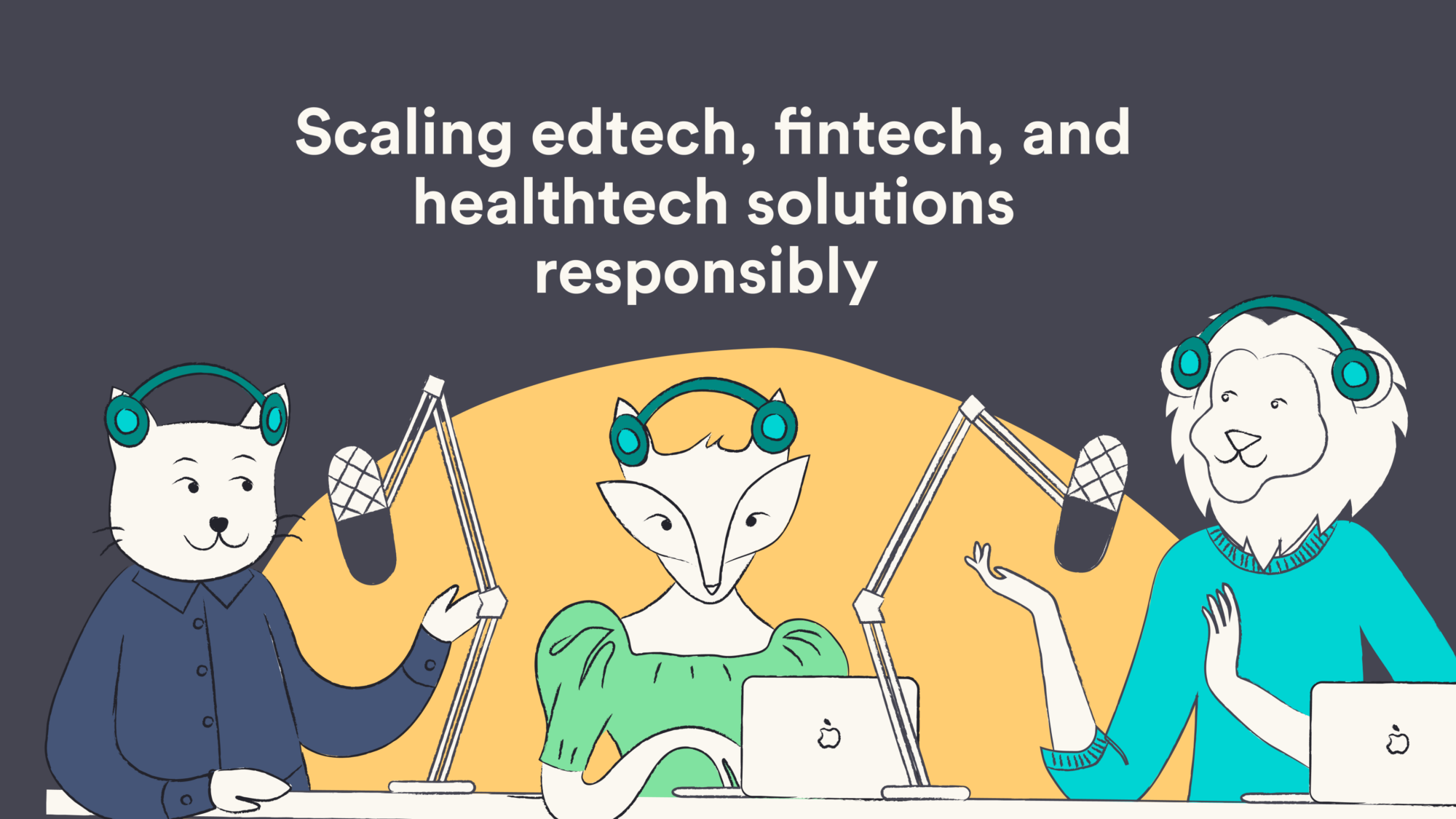Thanks to the AI boom, there’s been a wave of innovation across sectors like education, finance and healthcare, with the emerging technology often framed as the key to solving entrenched issues.
We need to be careful about not encoding inequities–in other words, embedding socioeconomic hierarchies into the technologies themselves. It is no surprise that regulations are increasingly cropping up to promote this care–particularly in the UK. And so, now more than ever, it is commercially, as well as ethically, important for organisations to design, deploy and scale their solutions with mechanisms of transparency, accountability, and a view of the long-term societal impact.
On Tech Can’t Save Us, we’ve been talking to innovators who are embedding these principles at the core of their work. We spoke to Rushab Shah, CEO of OneHive, about harnessing technology to reimagine education systems, Yaseen Rostom, founder and CEO of Incredible, about how fintech solutions depart from the discriminatory logics and legacies of credit scores, and Finn Stevenson, co-founder and CEO of Flok Health, about scaling autonomous treatments in the NHS. The underlying wisdom governing all these organisations is responsible scaling, a framework distilled by Gaurab Bansal, Executive Director of Responsible Innovation Labs.
Responsible innovation is key to sustainable change
As Gaurab points out, start-ups are under immense pressure to grow quickly, but that often leads to shortcuts that can have unintended consequences. With many initiatives promoting responsible development via the question of what is being built and/or who is building it, Responsible Innovation Labs alternatively focuses on the how:
“What’s the methodology? What’s the mindset that founders and investors go to navigate very hard decisions? […] We’ve been calling it sort of like a sound start-up mindset that you go into various parts of your operations.”
And Responsible Innovation Labs is working to make this sound start-up mindset table stakes for how you build a great company. To do so, Responsible Innovation Labs doesn’t bang on an ethical drum, but rather frames responsible innovation within the business problems that founders and investors encounter when scaling:
How do you use it to attract the best talent? How do you use it to build trust with the customer so you can close a deal? How do you use it to get ahead of the risks that are lurking around the corners? Inevitably tech these days is under increased scrutiny and that’s coming for everybody.
In our discussions with Rushab, Yaseen, and Finn, the three founders spoke about their approach to responsible innovation in education, health and finance respectively.
Using the technologies of tomorrow to reimagine the systems of today
Rushab Shah’s OneHive is focused on personalised learning, leveraging data to match students with tutors based on learning styles, hobbies and life experience–and the platform has shown promise with a 93% first-time match success rate and an 86% student retention rate.
However, there’s a bigger conversation to be had beyond just personalisation. It’s not just about cultivating a learning ecosystem that is flexible to the learner, but also one that is flexible to the changes in the world:
“The only thing that’s predictable today is that things will change, and they are changing at a rate of knots [….] Understanding the technologies of tomorrow should be more core [to the education system]. […] So my challenge to the education system is things are changing, so step with the change.”
While Rushab’s product is a digital educational ecosystem, his mission extends to reimagining the education system itself. As a comprehensive learning ecosystem that encompasses platforms tailored for K-12 students (TutorHive) and professionals (HydrogenHive), OneHive views education as a continuous journey, not confined by the boundaries of traditional schooling or the learner’s age. And by promoting awareness of hydrogen, a largely untapped power source that has near-zero greenhouse gas emission, OneHive demonstrates how education lies at the heart of environmental change.
Yaseen Rostom’s Incredible has a similarly ambitious mission. As a platform that enables users to repay all their credit card debts in one app, Incredible makes it easier for users to manage their debt. This, in turn, makes Incredibles users more likely to be accepted for more loans with better interest rates. The platform, therefore, leverages technology in order to depart from the discriminatory logics and legacies of credit scores:
“Going back decades now, there was so many examples of ethnic minorities not being able to take out a mortgage or not being able to get out a loan simply for the colour of their skin or where they live So this notion to move to cash flow underwriting made possible by open banking connectivity means you’re essentially looking at on the basis of what is the income? What are the outgoings? Can they afford a loan? Yes or no. And in doing so, you do tend to remove the biases that exist. So we’re seeing some really exciting changes there.”
Both Incredible and OneHive, then, rethink educational and financial systems, designing and deploying their platforms with a long-term view on the impact their innovations have on larger systems.
Scaling responsibly in healthcare
Flok Health, co-founded by Finn Stevenson, is using AI to address the overwhelming demand for physiotherapy services. With over 300,000 people currently on NHS wait lists for MSK physiotherapy (accounting for a third of GP appointment), and one quarter of those patients waiting over 3 months to be seen, over 30 million working days are lost to MSK conditions every year in the UK.
Having completed several successful trials with NHS Trusts, Flok will roll out the first NHS AI-run physiotherapy clinic later this year. Rather than upending traditional care procedures, Flok supplements them:
“It’s totally about working in parallel, in partnership with traditional services, so that the right patients get the right care in the right place from the right kind of service, and that no by significantly automating some of the really high volume pathways that we can free up that scarce resource in the traditional pathway to focus on where it adds the most value and where it’s most important.”
Yet while building Flok, Finn realised the tool was addressing a demand that was wider than the needs of MSK patients—for instance:
“Women’s public health conditions are a really good example where patients encounter really significant challenges around speed and frequency of access to care, and also [another example is] MSK pathways like hip and knee osteoarthritis. These are pathways that, at the moment, you see people having joint replacements earlier than they need to, and having worse outcomes than they should have […] So, work is well underway on those additional pathways.”
So, the process that Flok undertook to enable the integration of its autonomous MSK clinic in the NHS–including developing a domain specific programming language and a real-time video assembly for the UX, conducting consultations with clinicians and patients, and gaining approval from the CQC–will be re-encountered with different patients in mind.
What Flok hopes to bring for all future patients, though, is a greater understanding of the psychosocial impact of pain, and how community-based, non-physical interventions are key to treatment. Flok, therefore, approaches the guardrails to autonomous treatments within the NHS with both a regard for the merits of traditional services, and a view to responsibly reshape clinical practices.
A sound start-up mindset for sustainable change
Rushab, Yaseen and Finn all respond to Gaurab’s call: by working within existing systems and focusing on complementing, rather than replacing, traditional structures, they are creating sustainable solutions. These sound start-up mindsets, embedded into the fabric of their companies, ensures that technology is neither a silver bullet nor a band-aid placed on a festering wound, but one that can drive meaningful, long-lasting change.
This month’s episodes of Tech Can’t Save Us serve as a reminder that tech-driven solutions, no matter how advanced, will only succeed if designed and deployed responsibly. As Gaurab Bansal emphasises, responsible innovation isn’t optional—it’s essential for any start-up aiming to make a real difference.
At Tech Can’t Save Us, the conversation continues beyond each episode. Catch up on our latest discussions and stay tuned for more insights about responsible innovations.









